by Jill & Sarah | Oct 26, 2018 | In The Loop
History & Geography
We continued our unit on China this week. We watched a video about the Great Wall of China and read about its history. We learned about Chinese language and writing and practiced writing some Chinese characters ourselves. On Tuesday we got to
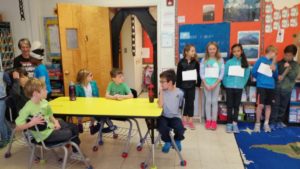
Learning about future history lessons from our peers.
see the 3/4 grade class put on an original play about Charlemagne.
Our objectives
• understand the importance of ancestors in Chinese beliefs.
• understand the ways that ancestor worship has been practiced
• recognize the Great Wall
• understand the feat of building the Great Wall
• understand how the Chinese language is written and read
• recognize the historical and artistic value of writing to the Chinese
Science
This week in our science domain Cycles in Nature, we finished learning about the life cycle of a frog. We spent the rest of week writing a paragraph about the life cycle of a frog. Students took notes, worked on a rough draft and we’ll finish editing these next week. We also learned the a fun new song about frogs.
Our objectives were to:
• explain that a cycle is a sequence of events that repeats itself again and again
• identify the 4 stages of the life cycle of a frog and use appropriate vocabulary when writing about these stages
• explain metamorphosis and amphibian
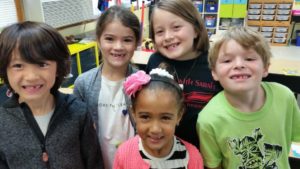
We all lost teeth this week!
English Spelling and Writing
In our journals we used the idiom of the week, “She is down in the dumps “. For spelling we worked on sorting our ways in a variety of way and took our practice test on Friday. Our word wall words this week were: children, clock, don’t, didn’t
La lectura
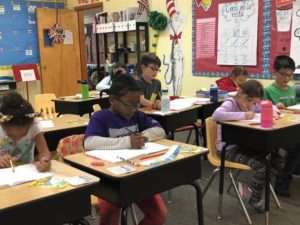 This week we reread Un hongo en la lluvia. Our weekly objectives were to:
This week we reread Un hongo en la lluvia. Our weekly objectives were to:
- Understand and practice the blends pr, pl, and dr
- Review using capital letters at the beginning of our sentences
- Use the comprehension strategies making predictions and summarizing
- Use the comprehension skill drawing conclusions
Our new high frequency words for next week are nueve, agua, and siete. Our review high frequency words for next week are bueno and gracias.
Las matemáticas
This week we finished working with subtraction up to 1,000 and began working with Bar Models. Our weekly objectives were to:
- Correct any missed problems on the math test
- Use bar models to solve addition and subtraction problems
- Apply the inverse operations of addition and subtraction
Specialists:
Music with Ms. Erin
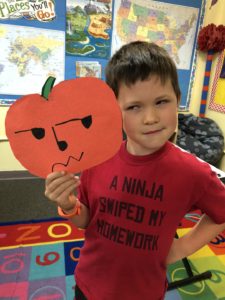 In October we learned about major and minor sounds, and how to sing the first five steps of the minor scale in Solfege. We introduced singing harmony. We learned about the xylophone and got to play student written songs on the glockenspiel. We also learned about Vivaldi, and listened to Autumn from his Four Seasons. We created Jack-o’-lanterns with faces made from musical notation symbols.
In October we learned about major and minor sounds, and how to sing the first five steps of the minor scale in Solfege. We introduced singing harmony. We learned about the xylophone and got to play student written songs on the glockenspiel. We also learned about Vivaldi, and listened to Autumn from his Four Seasons. We created Jack-o’-lanterns with faces made from musical notation symbols.
In November we will be focusing on various instruments, and the styles of music they are popularly used for – including piano (classical, jazz, rock), violin (classical, celtic fiddle, contemporary), and guitar (classical, blues, rock).
We will get to hear some famous pieces by composers Bach, Mozart, and Beethoven. We will also listen to classical violinist Itzhak Perlman, and contemporary violinist Lindsey Stirling.
Art with Ms. Kelly
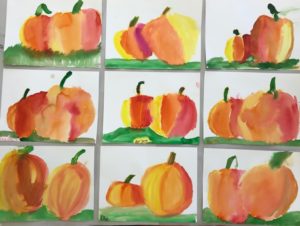 The first and second graders have painted some beautiful pumpkins this month. They learned how to overlap shapes to make their pumpkins look more realistic, and they used tempera paint to mix their own orange and green colors. The following week they used watercolors to make some more beautiful pumpkin paintings – these glowing pumpkins are on the bulletin board at the end of the hall.
The first and second graders have painted some beautiful pumpkins this month. They learned how to overlap shapes to make their pumpkins look more realistic, and they used tempera paint to mix their own orange and green colors. The following week they used watercolors to make some more beautiful pumpkin paintings – these glowing pumpkins are on the bulletin board at the end of the hall.
We also started a Chinese dragon picture, using a variety of textures. The students are learning how to combine stamping, collage (cut out shapes), and drawing to create a famous Chinese symbol. We also looks at Eric Carle’s book Dragons Dragons for inspiration. Hopefully we can finish these next week on Halloween!
Many thanks to Barbara Wagner for helping out in this class, as well as the 5th/6th grade class! She also provided several pumpkins and dried artichokes for all the students to observe for their various art projects.
by Sarah Segall | Oct 26, 2018 | In The Loop
La lectura
This week we read El lobo y su sombra. This is a fable where when a wolf sees his large shadow, his ego puffs up to match it, but the mighty lion knows the truth about the wolf and his shadow.
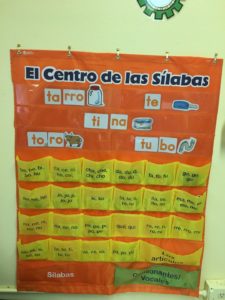 Our weekly objectives were to:
Our weekly objectives were to:
- listen attentively to whole group stories.
- ask appropriate questions.
- learn that a fable is a type of story that allows us to learn something.
- practice the comprehension strategies of monitoring and clarifying and predicting.
- correctly write the letters S and T using lines as guides.
- identify sounds and put them together to form syllables.
- identify the beginning sound in words.
Las matemáticas
We had a great time working on writing our numbers correctly, counting through 30, identifying which number comes before and after.
Our Learning Targets:
- I can recognize numbers 0 to 9.
- I can count to 10.
- I can read and write the numeral 10.
- I can rote count to 20.
- I can count from 10 to 12.
- I can read and write the numerals 10 to 12.
- I can count from 13 to 16.
- I can read and write the numerals 13 to 16.
- I can count from 17 to 20.
- I can read and write the numerals 17 to 20.
- I can compare groups of up to 20 objects.
- I can order groups of up to 20 objects.
First Grade Learning Targets:
- I can count on to add.
- I can use number bonds to add in any order.
- I can write and solve addition sentences.
- I can tell addition stories about pictures.
- I can write addition sentences and stories.
- I can solve real-world problems by using addition.
History & Geography
This week we continued our unit on Native Americans of North America. We continued to work on our class Native American chart, comparing and contrasting our lives with the Native American tribes. This week we continued to compare the Sioux. We learned about the legend of the Indian Paintbrush. The class drew pictures related to what they have learned about the Sioux.
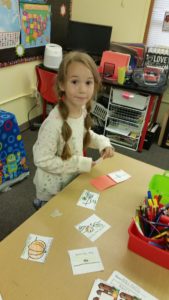 Our objectives this week were:
Our objectives this week were:
• identify the environment and which the Sioux lived
• identify the Sioux as a nomadic tribe
• describe the food, clothing, and shelter of the Sioux
• begin to contrast and compare your life to Native Americans with a focus on area living, clothing, food, and shelter.
Science
This week we took our assessment on the farm. We had a fun making our Old McDonald’s Farm book. On Thursday we began our new science domain on the five senses. We started off by learning how amazing our senses are. We had fun using all our senses on a pumpkin.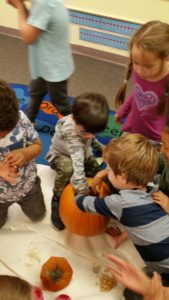
Our objectives were to:
• identify the side senses: sight, hearing, smell, taste, touch
• identify each of the body parts associated with the five senses
• describe how the five senses help humans stay safe and learn about their world
Spelling/Writing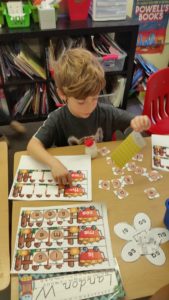
In our journals the class wrote about how they can use their senses on a pumpkin. We finished up working on our pumpkin sight words; students built the words, traced them, and wrote them. Our word wall words this week were: do, she, has, was. In our Robot Binders we added a pumpkin poem.
Specialists:
Art with Ms. Kelly
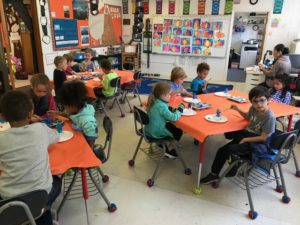 The kindergarten/first grade class has been working hard on painting pumpkins and also making robots. The students learned how to draw a pumpkin and how to mix primary colors to make the orange and green for their colorful pumpkins. I hope you’ve enjoyed their pumpkin patch on the bulletin board at school.
The kindergarten/first grade class has been working hard on painting pumpkins and also making robots. The students learned how to draw a pumpkin and how to mix primary colors to make the orange and green for their colorful pumpkins. I hope you’ve enjoyed their pumpkin patch on the bulletin board at school.
We’ve also worked on a couple robot projects. The kiddos glued together clay shapes that Fernando (Acelyn and Aries’s dad) made for them. We’re still in the process of putting the finishing touches on these cute little robots. The students also learned how to make a “Recycled Robot” from paper cups, straws, boxes, etc.
Many thanks to Zanea’s mom Candace for helping out in the K/1 class this month! The sign up sheet for helping out in art is on the bulletin board by the office, or you can contact Marilu in the office.
I’m looking forward to seeing the students’ Halloween costumes next week!
by Ivary & Paola | Oct 19, 2018 | In The Loop
La Lectura
Congratulations to all our students for successfully completing another book club! So much learning accomplished, so many more memories made. Esperanza renace!
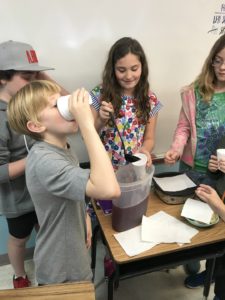
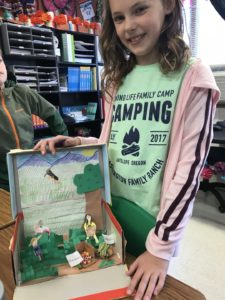
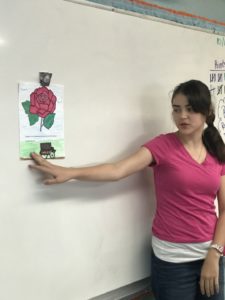
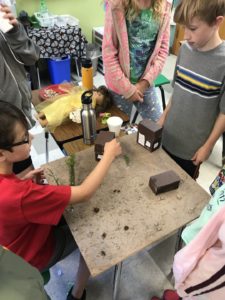
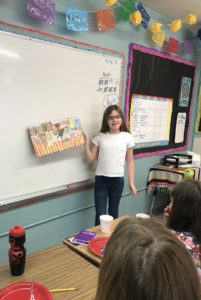
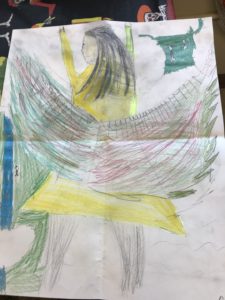
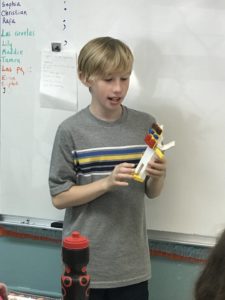
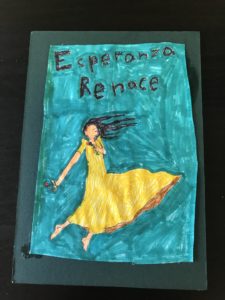
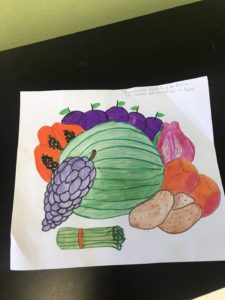
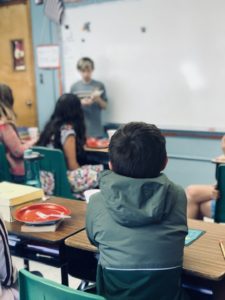
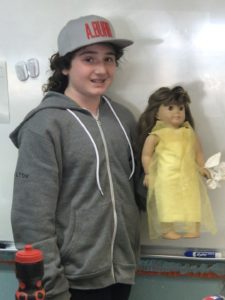
Every week in literacy, we introduce some essential questions. Based on their personal experiences and in a collaborative manner, students start generating possible answers. We provide students with many opportunities for dialogue and dialectic (oral language development). This week the essential question were: What are some of the characteristics that make humans different form the rest of the species? What is money and why is it used? What factors influence how people use money? We analyzed the quote “Money can’t buy happiness”.
Other objectives this week included:
• Identify key characteristics of expository texts and different sources of media.
• Define the theme or main idea of a text and how these are transmitted through certain specific details.
• Define the point of view or the purpose of the author of a text, and explain how these authors manifest themselves in the text.
• Follow and evaluate the argument of a text and its specific assertions. Distinguish those statements that are based on reasons and evidence, those that do not.
• Correctly use the written accent according to the tonic accent in words at the grade level applying a systematic analysis (compound words).
• Identify main and juxtaposed sentences.
Students took home a rubric that explains the end of the unit project that will be done in class next week. Please have your child explain it to you. If you have any questions, please do not hesitate in contacting me! Oh, and don’t forget to study for our mini-grammar quizzes every Monday!
Ciencias
This week students read science materials to better understand the concepts of community, ecosystem and environment. Students sorted organism pictures into two sets, based on the kind of physical environment in which the organisms might live, aquatic or terrestrial. They started to assemble an aquarium and a terrarium in preparation for introducing organisms next week.
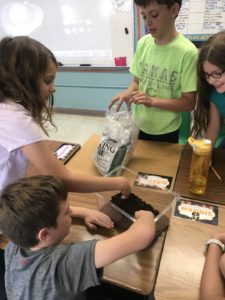
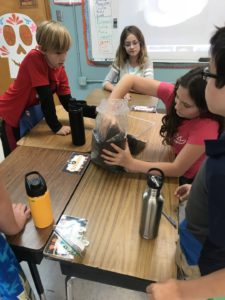
Mathematics
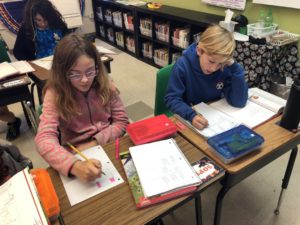 This week we continued working on Chapter 3 Multiplying and Dividing Fractions and Decimals. Our objectives were:
This week we continued working on Chapter 3 Multiplying and Dividing Fractions and Decimals. Our objectives were:
- Multiply a decimal by a decimal
- Divide a fraction, whole number, or mixed number by a fraction or a mixed number
History & Geography
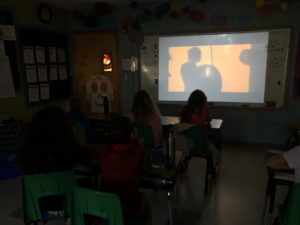 This week we continued learning about Ancient Greece and Rome. Our objectives were:
This week we continued learning about Ancient Greece and Rome. Our objectives were:
- Understand the achievements of Sparta and Athens during the wars
- Describe the persian Wars and the battles of Sardis, marathon, Thermopylae, and Salamis
- Recognize the successes of Pericles, including the formation of the Delian league and the rebuilding of the Acropolis, including the Parthenon
- Describe the architecture of the Parthenon
- Identify contributions that Aristophanes, Aeschylus, Sophocles, Euripides, Herodotus, Thucydides, and Hippocrates made to Greek culture
English Writing & Spelling
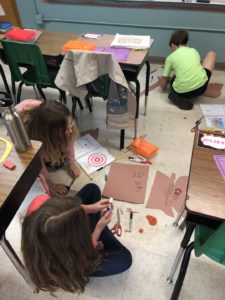 Our objectives for writing were:
Our objectives for writing were:
- Understand how to use dialogue effectively to advance the plot of a narrative writing piece
- Write a topic sentence for our conclusion paragraph of our narrative
- Write our rough draft
Our Greek and Latin roots this week were:
- Cor- heart
- Cred, cert- believe, sure, trust
- Create a bulletin board with all the Greek and Latin Roots we have learned so far
by Sarah Segall | Oct 19, 2018 | In The Loop
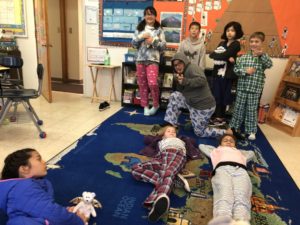
A little late, but here is Ramon’s picture of pajama day last week. Thank you Ramon for being the photographer.

These girls took learning about Charlemagne to a whole new level. They have written and are directing a play for the whole class to participate in about the story of Charlemagne.
I also loved Luke’s comment regarding Charlemagne. “Since Charlemagne translates to Charles the Great, does that mean I can be called Lukemagne?”
Newsletter by Alora:
- In art we finished our midieval letters.
- In social studies we learned about the Code of Chivalry.
- In spanish we took our science test and looked at the point key (rubric).
- In math we did division flashcards outside. When we got one right, we took a step.
History & Geography
Our weekly objectives were to:
- Describe the elements of a typical castle and explain their role in defense.
- Describe life inside a castle.
- Understand the role of knights in the Middle Ages.
- Describe a knights armor and his training.
Kate, Marisol, and Naomi have written a fabulous play about Charlemagne. They are directing and have roles in the play. We spent some time this week rehearsing.
Mathematics w/Laura
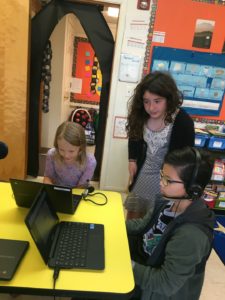
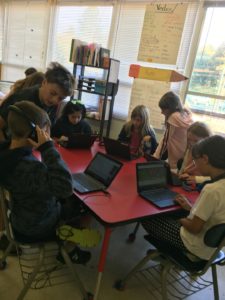
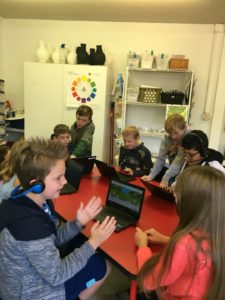 Whole Number Multiplication and Division
Whole Number Multiplication and Division
- Flash cards and timed test practices for multiplication and division!
- More real world problems (word problems) using multiplication and division
- Math Journal writing & Put On Your Thinking Cap
- Review of multiplication and division
- Set up our online accounts to prodigygame.com with the help of the 5/6 class
- (Go to prodigygame.com then click on: Play Prodigy (box) in upper
- right hand corner then ‘Sign in with Google” using your school Google
- account). Students should work online at least 45 minutes each week,
- including any in-school time that might be available
We completed our Chapter 3 assessment on Friday, October 19th
Puzzles available for extra credit and Friday (Math) Bingo
Remember: MATH …. It’s everywhere!
La lectura
We completed a comprehension quiz on last week’s reading book. We had a brief lesson on how to use the question to help formulate a complete sentence. We will have quizzes like this after every story we read in class and every story that is assigned for home reading. An orange sheet was attached to the quiz for more information on how your child can become a better reader.
Our weekly objectives were to:
- write thesis statements.
- identify the three types of verbs: action verbs, helping verbs, and linking verbs.
- correctly conjugate verbs to show noun-verb agreement.
- identify and use details to enhance our reading and writing.
- write a rough draft for our autobiographies using main idea sentences.
- practice cursive writing through a fun Friday game.
Students received a new reader on Thursday. The expectation is that they will read each evening for understanding and for fluency. They should be able to ask and answer questions about their reading. There will be a reading quiz on Tuesday.
Ciencias
This week we completed our assessment of the first science investigation: Soils and Weathering
Vocabulary used during this first investigation: abrasion, acid rain, basalt, calcite, chemical reaction, chemical weathering, clay, conglomerate, earth material, expand, freeze, granite, gravel humus, limestone, marble, model, pebble, physical weathering, rock, sand, sandstone, silt, soil, system, weathering
The science assessments were graded using a rubric. Students were allowed to use their science journals during their exams. We thoroughly went through the exam, after grading, so they could see the expectations and develop strategies for future exams. Students are expected to do test corrections on a separate paper and turn them in with their original test on Tuesday.
by Jill & Sarah | Oct 19, 2018 | In The Loop
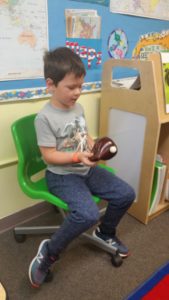
Sharing items from a trip to China
History & Geography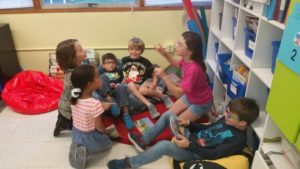
This week we continued our unit on China. We read a lesson on Confucius and the principals behind his philosophy. The class had fun breaking into group and acting out situations that showed people being virtuous. We also learned about significance of family and ancestors to the Chinese.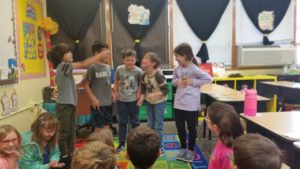
Our objectives
• understand the basic principles of Confucius
• recognize the influence of Confucianism on Chinese government and culture
• understand the importance of ancestors in Chinese beliefs
• understand the ways that ancestor worship has been practice
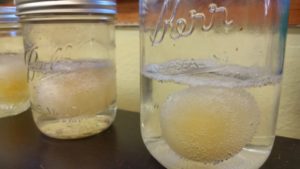 Science
Science
This week in our science domain Cycles in Nature, we finished learning about the life cycle of a chicken and began learning about the life cycle of frogs. We had fun with an egg experiment showing the chemical reaction of vinegar on an egg shell.
Our objectives were to:
• explain that is cycle is a sequence of events that repeats itself again and again
• identify the stages of the life cycle of a frog
• explain metamorphosis
• identify the different parts of a chicken egg
• explain how vinegar (an acid) reacts with calcium carbonate (egg shell) to change it into carbon dioxide, water, and aqueous calcium.
• observe the membrane underneath the egg shell.
English Spelling/Writing
In our journals we used the idiom of the week, “They’re going bananas “. For spelling we did two activities, and had both our practice and final tests. Our word wall words this week were: could, can’t,
La lectura
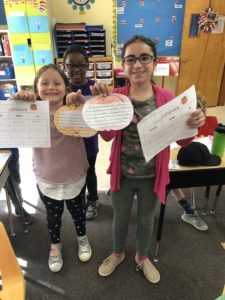
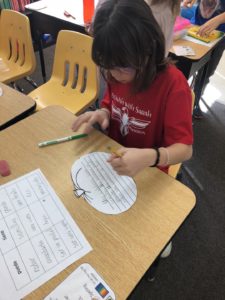 This week we reread Tomás y la señora de la biblioteca.
This week we reread Tomás y la señora de la biblioteca.
Our weekly objectives were to:
- review all the high frequency words we have learned this unit
- use the comprehension skill point of view as we read the story the second time
- Review possessive pronouns by creating possessive pronoun spiders
- Review common and proper nouns
Our high frequency words for next week are siempre, primero, and pronto
Las matemáticas
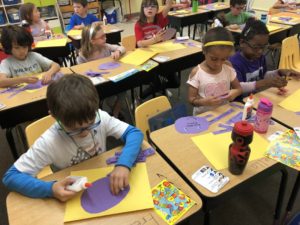 This week we continued working with subtraction up to 1,000. Our weekly objectives were to:
This week we continued working with subtraction up to 1,000. Our weekly objectives were to:
- Use base ten blocks to subtract with regrouping
- Apply the inverse operations of addition and subtraction
- Solve real-world subtraction problems
by Sarah Segall | Oct 19, 2018 | In The Loop
La lectura
This week we read a very fun story about a bear who sees his shadow during a fishing trip. The bear spends all morning trying to escape from his shadow but nothing works until noon, when his shadow finally goes away. We stopped, turned out the lights, and used a flashlight to show how long the shadows are during sunrise and then how the shadows get shorter as the sun rises high in the sky. At noon the sun is directly overhead and our shadows are underneath us.
When the bear woke up he saw his shadow had returned. He went fishing again but saw that his shadow was no longer in the water to scare the fish. We talked and used the flashlight to show that in the afternoon the sun is on the other side and so is your shadow.
Our weekly objectives were to:
- put syllables together to form words
- identify the first sound of given words
- identify the first syllable of given words
- identify rhyming words
- write using the lines to help guide us in correct sizing
- form sentences using the daily sight words: veo (I see), tiene (he/she has), y (and)
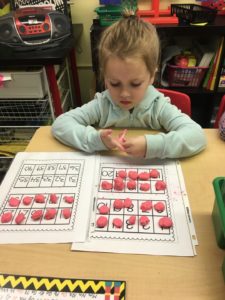
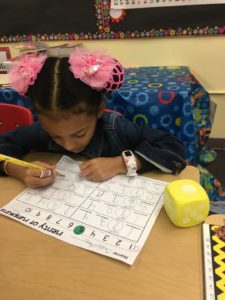
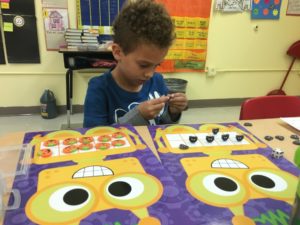 Las matemáticas
Las matemáticas
We celebrated the 30th day of school this week with some play dough fun on our tens-frames mats. We also did a LOT of counting and had fun with our “volcano” pajillas. (Every day we add a straw to the one’s place on our calendar. When we get to 10 ones, they just won’t fit and they fly out and all over the class. I’m guessing this is why the kiddos started calling this the ‘volcano’, a term unique to this group of kiddos.)
We also continued working on our strategy of identifying the number that comes before and after a given number. We have really been working with the number line. The number line is a great tool to help us with number identification, counting on, counting backwards and even place value.
History & Geography
This week we continued our unit on Native Americans of North America. On Friday we began a class Native American chart to compare and contrast our lives with the Native American tribes we are learning about. We also began reading about the Sioux and the buffalo.
Our objectives this week were:
• identify the environment and which the Sioux lived
• identify the Sioux as a nomadic tribe
• describe the food, clothing, and shelter of the Sioux
• begin to contrast and compare your life to Native Americans with a focus on area living, clothing, food, and shelter.
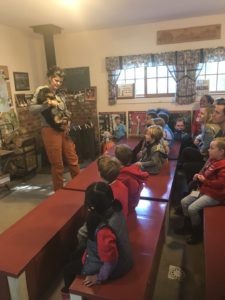 Science
Science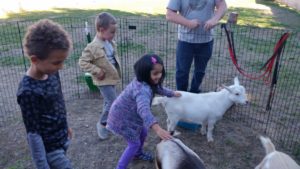
This week we are wrapping up our science domain on the farm. We had a fun learning about goats and visiting with some at school on Tuesday. Our field trip to Old McDonald’s farm in Corbett was lots of fun and educational. Friday the class learned about modern agriculture.
Our objectives were to:
• describe how farming has changed over the years
• identify machines and tools of farming
• explain why farmers grow crops
• identify crops as plants grown on farms for use as food
• sequence events of crops from Farm to store ( planted, harvested, transported, packaged)
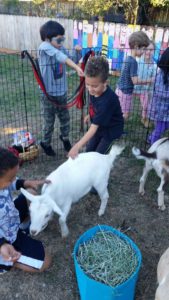 • identify goats and how they eat, recall that they have 4 stomachs and they chew their cud.
• identify goats and how they eat, recall that they have 4 stomachs and they chew their cud.
English Spelling/Writing
In our journals the class wrote about the field trip. Our word wall words this week were: see, like, we, brown. This week in spelling the red group got a new spelling sort on animals, other living things, and non living things and the blue group is sorting “ad” and “an” family words. Everyone worked on a pumpkin sight word activity.
Specialists:
Music This week we went up and down the scale (we used a slide) with Do-Re-Mi-Fa-So-La-Ti-Do. This was great practice with our letter-sound/syllable recognition also. We sang a few syllable songs. Here is a link to a syllable song: https://youtu.be/bO23pUTXyA4
by Ivary & Paola | Oct 12, 2018 | In The Loop
La Lectura
This week in literacy, our conceptual theme was: Living in a Dynamic Planet. In connection to science, the focus question was : How do natural forces influence and affect the Earth? We read the piece El monstruo de la montana, and discussed the different non-fiction/ expository features. We also discussed how authors use different literary devices to make writing more appealing to the reader (figurative language).
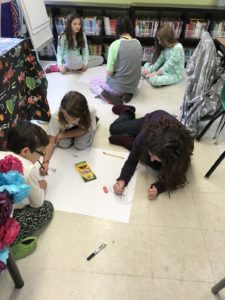 Other objectives this week included:
Other objectives this week included:
• Identify key characteristics of expository texts and different sources of media.
• Define the theme or main idea of a text and how these are transmitted through certain specific details.
• Summarize the text without giving opinions or personal judgments.
• Cite relevant evidence from the text to explain thinking, both in oral and written form.
• Demonstrate understanding of figurative language, of the relationships between words and nuances in the meaning of words.
• Interpret the figures of language (for example: personification, metaphors and other tropes) in context.
• Correctly use the written accent according to the tonic accent in words at the grade level applying a systematic analysis (Enclitic Pronouns)
• Read grade level poetry and prose orally with accuracy, appropriate rhythm and expression in progressive readings.
• Identify main and subordinate clauses.
We had so much fun getting together for our literature studies, Esperanza renace. Sadly, our book club will be coming to an end next week. We will have our last discussion on Tuesday, October 16th, where students are expected to share their final book art projects.
**Reminder** Due to not having classes on Friday, please remind your children they will be having their spelling and grammar quiz on Monday. Thank you!
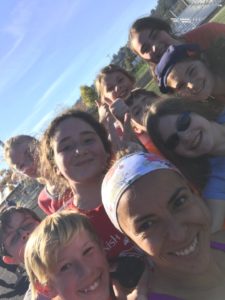
We had so much fun during our Pumpkin Run!
Ciencias
• Observe milkweed bugs. Monitor changes that yield information about their life cycle and reproduction.
• Analyze and sort images on cards to determine which represent individuals, populations, communities, and ecosystems.
• Identify biotic and abiotic elements in an ecosystem.
• Accurately apply scientific terminology and vocabulary in oral and written form.
Mathematics
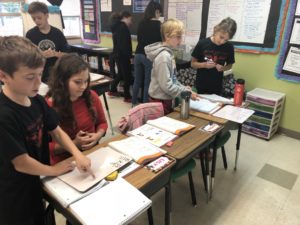
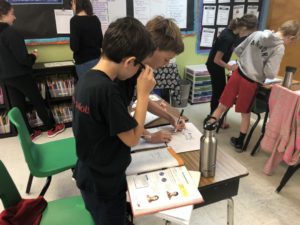 This week we began Chapter 3 Multiplying and Dividing Fractions and Decimals. Our objectives were:
This week we began Chapter 3 Multiplying and Dividing Fractions and Decimals. Our objectives were:
- demonstrate understanding of Negative Numbers and the Number Line on the chapter test
- recall prior knowledge of adding and subtracting decimals and multiplying fractions by fractions
- divide a fraction, whole number, or mixed number by a fraction or a mixed number
History & Geography
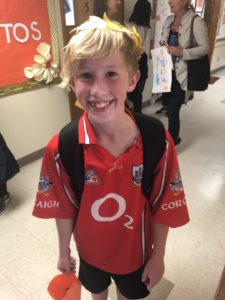
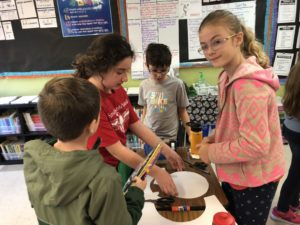 This week we continued learning about Ancient Greece and Rome. Our objectives were:
This week we continued learning about Ancient Greece and Rome. Our objectives were:
- explore excerpts from Homer’s Iliad and The Odyssey
- understand the importance of athletics and physical competition to ancient Greeks
- describe the Olympic truce, events, prizes, and legacy
English Writing & Spelling
Our objectives for writing were:
- understand how to engage and orient the read by establishing a context and introducing a narrator and characters
Our Greek and Latin roots this week were:
- clam: to cry out
- clud, clus: to shut
- cogn: to know
Our roots quiz will be on Monday October 15th.
Specialists
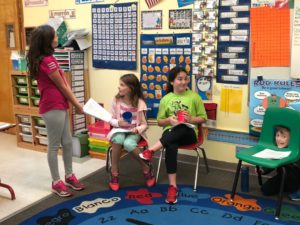
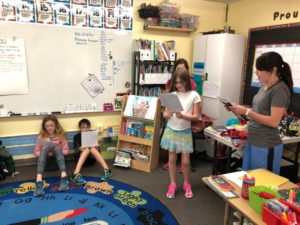 Character Education with Ms. Jennie
Character Education with Ms. Jennie
This month we are focusing on the theme of responsibility. We are talking about what this means in practical terms and of course it includes everything from helping our parents/families and doing our schoolwork to taking responsibility for our mistakes by telling the truth, apologizing, and accepting the consequences (no excuses, blame-shifting, etc.). We are continuing to read Number the Stars and have tied our theme of responsibility into our discussions about the story. Are we responsible for the safety of others? Would you feel responsible to protect a friend or even a stranger in a time of great danger or difficulty? We also did Reader’s Theatre (photos) of Chapter 1. The kids did so awesome at re-enacting this.
by Sarah Segall | Oct 12, 2018 | In The Loop
History & Geography
Our weekly objectives were to:
- Identify Charlemagne as a European leader of the late eighth and early ninth centuries.
- Describe Charlemagneś qualities and understand his achievements.
- Understand the rise of feudalism.
- Describe feudalism and understand how it differed from modern government.
Newsletter
On Monday it was pj day. Almost everybody had a stuffed animal. One had a blanket.
On Tuesday it was SWS colors which meant that we wore school colors that are red and black.
On Thursday we had The Pumpkin Run.
On Friday there was no school.
By: Pierce
Edited by: Kate
Mathematics w/Laura
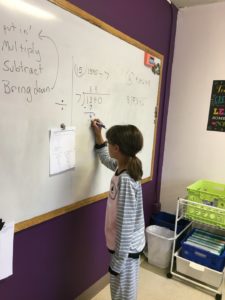 Whole Number Multiplication and Division
Whole Number Multiplication and Division
- Flash cards and timed test practices for multiplication and division!
- Dividing by a one digit number (day 2)
- Real world problems (word problems) using multiplication and division
- Assessment: next week on Friday, October 19th
Puzzles available for extra credit and Friday (Math) Bingo
Remember: MATH …. It’s everywhere!
La lectura
It was a short week for Language Arts this week. I made copies of our weekly story so the students would have more time and could read through it on their own at home.
Our weekly objectives were to:
- work on our dictionary skills.
- identify prefix, suffix, and root of words.
- take our weekly spelling test and use our dictionary skills to look up unknown words from our new spelling list.
Please be sure to have your child read every single day. They should be reading their Spanish stories out loud. They are doing a great job with the reading challenge. Keep recording those minutes!
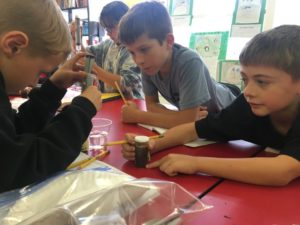 Ciencias
Ciencias
Focus Question: What’s in our schoolyard soils?
We collected and observed different soils from several locations in the schoolyard. We analyzed the soil samples to determine how much humus and rock material are in local soils.
Our weekly objectives were to:
- plan and carry out an investigation
- describe soils based on their properties
- compare soils based on their different kinds and amounts of earth materials and humus
- realize that weathering is the breakdown of rocks and minerals at or near the Earth’s surface
Specialists:
Character Education with Ms. Jennie
This month we are focusing on the theme of responsibility. We are talking about what this means in practical terms and of course it includes everything from helping our parents/families and doing our schoolwork to taking responsibility for our mistakes by telling the truth, apologizing, and accepting the consequences (no excuses, blame-shifting, etc.). We are continuing to read Wonder which the kids are loving. We are doing a lot of “word work” – looking up and writing down the definitions of vocabulary in our notebooks and practicing dictionary skills!! Guide words at the top of the pages tell us if we’re looking on the right page!
by Jill & Sarah | Oct 12, 2018 | In The Loop
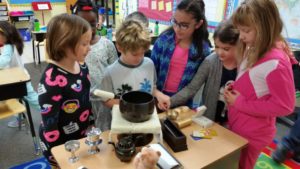 History & Geography
History & Geography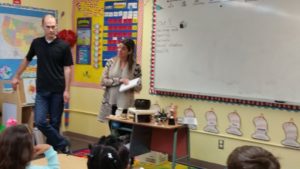
This week we finished our Ancient India unit and took the assessment. We had a presentation on modern day Buddhism by Carla and we got to try an assortment of Indian food. Our field trip to the Lan Su Chinese Garden and the Golden Horse restaurant was great! We were introduced to a variety of Chinese cultures and traditions. This was a wonderful way to kick off our next section on Ancient China.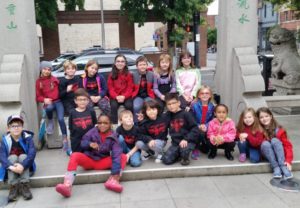
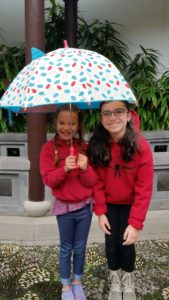 Our objectives
Our objectives
• find China on a map and identify some important land forms
• understand the role of China’s rivers in the formation of this ancient civilization
• describe how China’s rivers have been both helpful and destructive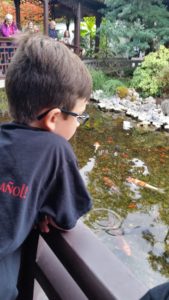
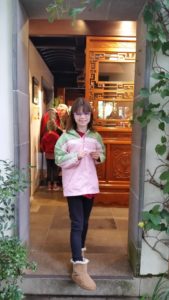
Science
This week in our science domain Cycles in Nature, we continued to learn about the life cycle of a chicken. We learned about the different parts of an egg and how it changes once it’s fertilized. The class watched a fast motion video that showed the chicken fetus developing inside the egg. We also did and egg experiment examining density.
Our objectives were to:
• explain that a cycle is a sequence of events that repeats itself again and again
• identify the stages of the life cycle of a chicken (egg to egg)
• identify and label the different parts of a chicken egg
• explain how freshwater and saltwater affect an egg’s ability to float.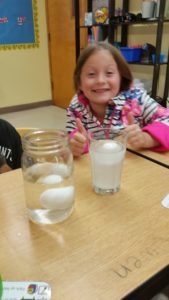
English Writing/Spelling
In our journals we used the idiom of the week, “He has butterflies in his stomache ” and we also wrote about the cycle of a chicken egg. For spelling I met with each group and went over the new sorts. Our word wall words this week were
La lectura
This week we read Tomás y la señora de la biblioteca.
Our weekly objectives were to:
- review all the high frequency words we have learned this unit
- use the comprehension strategies adjusting reading speed and summarizing as we read the story the first time
We had so much fun at the Pumpkin Run this week, it was great seeing kiddos cheering each other on.
Next week we will continue reviewing high frequency words from this unit!
Las matemáticas
This week we began working with subtraction up to 1,000. Our weekly objectives were to: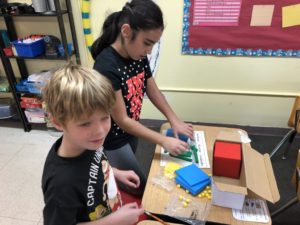
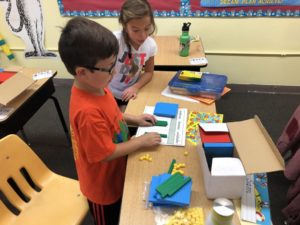
- use base 10 blocks to subtract numbers with and without regrouping
- subtract from three-digit numbers with and without regrouping
- apply the inverse operation of addition and subtraction
- solve real-world subtraction problems
Specialists:
Character Education
This month we are focusing on the theme of responsibility. We are talking about what this means in practical terms and of course it includes everything from helping our parents/families and doing our schoolwork to taking responsibility for our mistakes by telling the truth, apologizing, and accepting the consequences (no excuses, blame-shifting, etc.). We have a fun little song to the tune of Mickey Mouse that helps us remember what responsibility looks like. We read the Aesop’s fable The Ant and the Grasshopper about the responsible ant who stored up food for the winter and the lazy grasshopper who lazed around instead. And then we’ll be reading Horton Hatches the Egg next week! We are focusing on how our actions have consequences!
 This week we reread Un hongo en la lluvia. Our weekly objectives were to:
This week we reread Un hongo en la lluvia. Our weekly objectives were to: In October we learned about major and minor sounds, and how to sing the first five steps of the minor scale in Solfege. We introduced singing harmony. We learned about the xylophone and got to play student written songs on the glockenspiel. We also learned about Vivaldi, and listened to Autumn from his Four Seasons. We created Jack-o’-lanterns with faces made from musical notation symbols.
In October we learned about major and minor sounds, and how to sing the first five steps of the minor scale in Solfege. We introduced singing harmony. We learned about the xylophone and got to play student written songs on the glockenspiel. We also learned about Vivaldi, and listened to Autumn from his Four Seasons. We created Jack-o’-lanterns with faces made from musical notation symbols. The first and second graders have painted some beautiful pumpkins this month. They learned how to overlap shapes to make their pumpkins look more realistic, and they used tempera paint to mix their own orange and green colors. The following week they used watercolors to make some more beautiful pumpkin paintings – these glowing pumpkins are on the bulletin board at the end of the hall.
The first and second graders have painted some beautiful pumpkins this month. They learned how to overlap shapes to make their pumpkins look more realistic, and they used tempera paint to mix their own orange and green colors. The following week they used watercolors to make some more beautiful pumpkin paintings – these glowing pumpkins are on the bulletin board at the end of the hall.


 Our weekly objectives were to:
Our weekly objectives were to:


 The kindergarten/first grade class has been working hard on painting pumpkins and also making robots. The students learned how to draw a pumpkin and how to mix primary colors to make the orange and green for their colorful pumpkins. I hope you’ve enjoyed their pumpkin patch on the bulletin board at school.
The kindergarten/first grade class has been working hard on painting pumpkins and also making robots. The students learned how to draw a pumpkin and how to mix primary colors to make the orange and green for their colorful pumpkins. I hope you’ve enjoyed their pumpkin patch on the bulletin board at school.



















 Whole Number Multiplication and Division
Whole Number Multiplication and Division








 Las matemáticas
Las matemáticas Science
Science








 Character Education with Ms. Jennie
Character Education with Ms. Jennie Whole Number Multiplication and Division
Whole Number Multiplication and Division Ciencias
Ciencias








